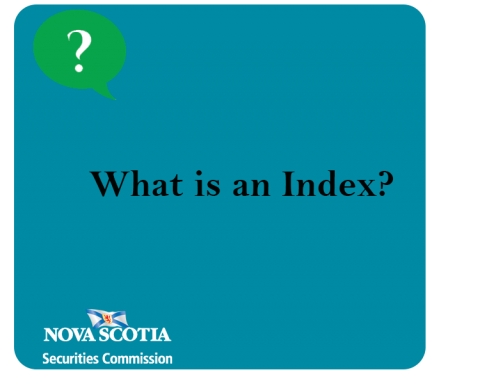Submitted by nsscadmin on

Every night on the evening news you hear that the market is up or down and rather large numbers and a up or down arrow are slotted in besides the words S&P 500, Dow Jones Industrial Average and S&P/TSX Composite. These are indexes.
Whenever you hear someone talking about the Dow Jones, or S&P/TSX Composite they are talking about an index. The definition of an index in finance is …
“a figure in a system or scale representing the average value of specified prices, shares, or other items as compared with some reference figure.”
Putting it into laymen’s terms an index is a small sample of the market, that is a representative of the whole. Investors use indexes to track the overall performance of the stock market. It gives them an idea of how the market is gaining or losing value. In the ideal system, a change in the price of an index would represent the same proportional changes in the stocks included within that index.
One of the first indexes was created in 1896 by Charles Dow. You can probably guess by the name it is what is now known as the Dow Jones Industrial Average (DJIA). When it was first created the DJIA consisted of 12 companies. Today it is comprised of 30 of the largest publicly traded companies in America and can come from any sector except transportation and utilities.
The Dow is one of the major indexes in America alongside the Standard and Poor’s 500 (S&P 500). The S&P 500 is comprised of 500 of the largest companies in America and tries to cover all major areas of the economy. It is important to note the S&P 500 does not include the largest 500 companies, but instead the 500 most widely held companies, determined by market size, liquidity and their industrial sector.
The S&P 500 is calculated using a market capitalization-weight. This means each stock in the index is represented in proportion to its market capital. So, the more value a stock has the more its value fluctuation effects the rise or fall of the Index price.
In Canada, the equivalent of the S&P 500 is the S&P/TSX composite. The performance of the S&P/TSX Composite is what you see on the news when they talk about the market being up or down. It is used as a benchmark to see the performance of Canada’s stock market.
The S&P/TSX Composite is comprised of the largest companies on the Toronto Stock Exchange (TSX), which is about 250 of the nearly 1500 companies that make up the TSX.
Some other notable indexes around the world that you may have heard of include the FTSE 100 in the United Kingdom, Nikkei in Japan and DAX in Germany.
